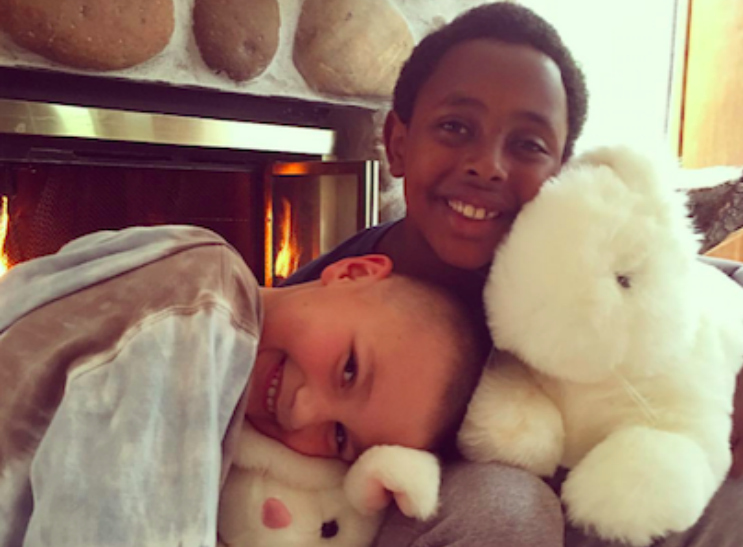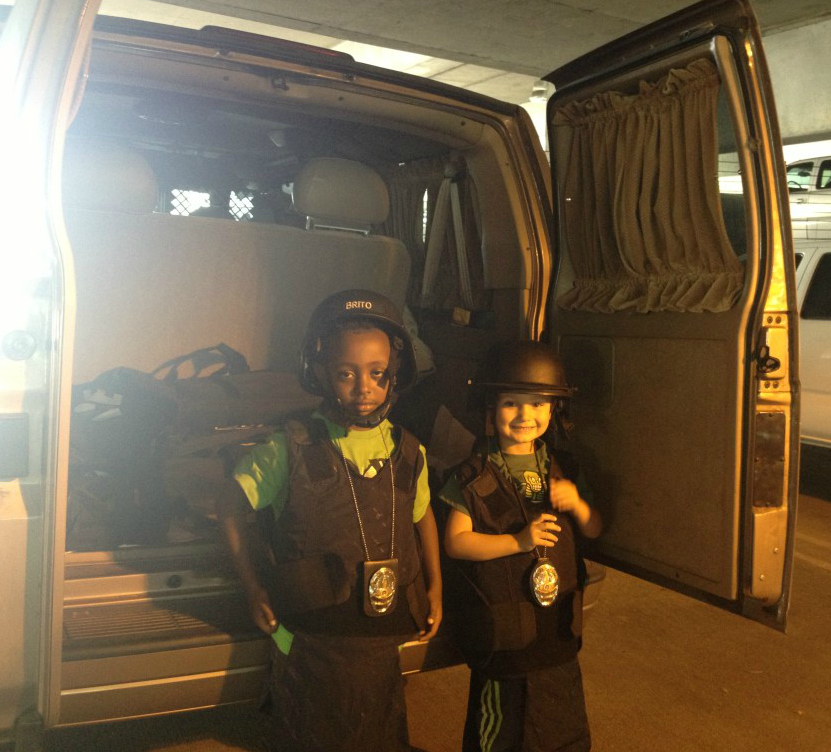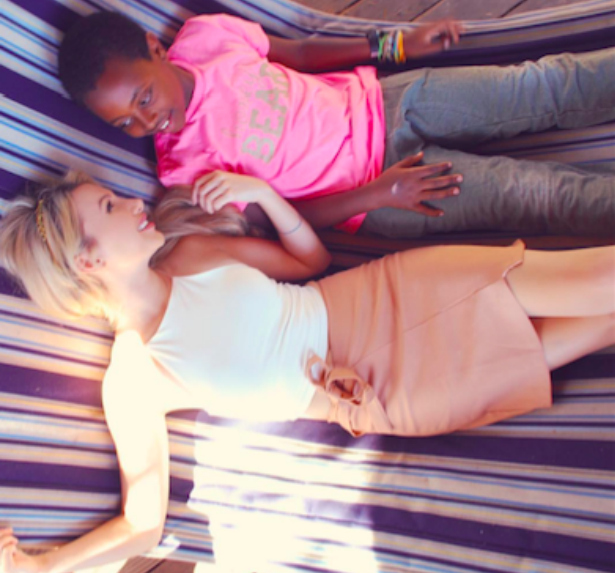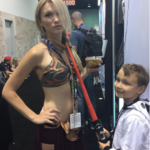“Did Uncle Johnny get shot by the police like the man in the video did?”
This is the question my 9-year-old son asked me, after hearing about Philando Castile's death after a police officer in Minnesota shot him four times while Castile's girlfriend broadcast it live on Facebook.
“No, Buddy, it was different,” I said. For me to explain my brother’s death via suicide by cop, triggered by a long battle with drug addiction, was an additional challenge I wasn’t expecting to add to this already heartbreaking discussion.
RELATED: Really, Nerf, You're Part of the Problem With Guns in the US
“Uncle Johnny wanted to die. He was very, very sad," I tried to explain. "The man in the video didn’t want to die. Uncle Johnny tried at least two different times to have the police shoot him, but they didn’t.”
“Why not?” My son asked. He was confused. This is all confusing.
My son asked me why I thought my brother’s life had been so aggressively protected by the police for such a long time, and why the “man in the video” [Castile] was so easily shot by this officer.
“Well, the first time he tried to pretend his cell phone was a gun when they pulled him over," I explained, carefully. "It was pulled out very fast, and the police would have been justified if they'd shot him. But the officer waited and saw it wasn't a gun and alerted the other officers not to shoot.”
I continued. My son wanted ansewers.
“Then, Uncle Johnny used a real gun, and it took him shooting at the officers to finally take his life by shooting back,” I said. “Do you see the difference, Sweetie?”
My son asked me why I thought my brother’s life had been so aggressively protected by the police for such a long time, and why the “man in the video” [Castile] was so easily shot by this officer. A couple of years ago, I had met the officer who took the shot that killed my brother. So I was able to partially answer this question: The officers had humanized my brother.
We then had a long, real discussion about things I could and couldn’t answer. This is all more complicated than just explaining to my kids the importance of current affairs. My son was adopted from Ethiopia when he was almost 4 years old. He, along with my biological child, are the sons of a white police officer.

They both know their white uncle died at the hands of police many years before they were born. We, as a family unit, are coming at last week's news coming to a head from an unusual perspective—so much so that our emotions are getting enmeshed in the real issues, and it’s hard to untangle them to give an objective view of the situation.
I tried to explain how police tactics are often misunderstood but are created to protect the officers. "Daddy wants to come home to them safely, too," I tell them. However, I don't agree that all tactics and actions by the police were ethical. In the same way our emotions and experiences fog our own thoughts in this discussion, so does the emotion and fight-or-flight mode of each officer in a risky setting.
And pretty much every encounter an officer has is a potential risk.
My boys and I discussed how racism plays a role in feeling a deeper risk, and how this is wide-spread in the police department. I tried to my best to explain how institutionalized racism isn’t intentional in today’s world, but that it continues nonetheless, a product of a privilege that is so deeply rooted in our culture it has persistently and insidiously targeted people of color for centuries. It continues because it has been normalized, it's something we're only now as a nation becoming aware of and confronting.
We are scared of people who aren’t like us, because we are scared of what we don’t understand.
My kids and I stepped back and even discussed the commoditization of black lives and what that means with regard to socio-economic class, the law and mass incarceration of people—particularly black men—in the U.S. I tried to simpligy as much as I could, but it was a tragic lesson for both of my boys, sitting next to each other, listening, questioning.
What I told them was that before the Civil War, most prisoners in the U.S. were white. Then, Congress passed the 13th Amendment—the one that banned slavery. That's when rates of jailed black men skyrocketed. These men couldn't officially be slaves, but through legal loopholes, African Americans were re-enslaved, not by individual owners but, this time, by the state. Andrea Smith argues in "Color of Violence: The INCITE! Anthology" that imprisonment would become one of the three pillars of white supremacy.
But that was getting a little in the weeds. My sons are just 9. In any case, it was important for me to point out that, for so many reasons, the police officer who shot Castile and other police officers who have similarly killed black men and boys for selling loose cigarettes or holding toy guns, truly don’t believe they are racist or that race plays a role in their actions. And THAT is the point I wanted to really drive home—both for the safety of my oldest son when he goes out into the world alone and also for both of them so that, through understanding, they can continue to ignite change.

Through talking about fear-based actions, suddenly everything made sense to them and they ended up making excellent points. Here's how we broke it down:
-
We are scared of things we don’t understand.
-
We are scared of people who aren’t like us, because we are scared of what we don’t understand. (Which is also why traveling and meeting people from all over the world has been such a big deal for me personally. It’s hard not to be empathetic when you truly get to know someone in their home.)
-
People who aren’t like us can mean a lot of things, but it often includes people who don’t look like us, talk like us or come from a different part of the world or the city.
When we finished the conversation, the first words out of my youngest son's, my white son's, mouth, will forever haunt me.
-
It’s biologically normal to be afraid of things we don’t understand. (This is an instinct that evolved to protect us from threats but does not apply to modern culture.)
-
It’s not good/positive/normal to live in Western society and be oblivious to racial biases, because people with skin color different than our own should not be foreign to us. The only reason that they may be is because, historically, our blatant murderous forms of racism has segued into this modern-day, hard-to-spot-for-a-white-person, racial segregation that is just as dangerous to people of color as our past shameful history.
When my oldest realized that most officers don’t actually want to shoot him but would be more inclined to shoot him than his white brother simply because of their own cognitive biases and lack of awareness to these social biases, he had a stoic but strong look in his eye. My little boy, who believed he was safe because he was good and sweet and loving was gone for a moment.
This broke my heart.

RELATED: This is Being Black in America
It reminded me of the novel "Room," when the mother and son are freed from the room, and the mother starts distancing herself from him, which was heartbreaking for the little boy but also a necessary evil in her mind. For me, the "room" represents my own lack of awareness about race and racism, because no matter how much I try to make myself aware, I’ll never understand what it is like to be black in the U.S. I just won’t. For his own safety and health, I can’t protect my son in that room anymore, and I wouldn’t want to even if I could. To be ignorant to the truths of the world is unhealthy and a disservice to everyone experiencing racial, ethnic, gender and any other social disparities on a daily basis.
When we finished the conversation, the first words out of my youngest son's, my white son's, mouth, will forever haunt me.
“Do you think Samuel is safer back in Africa?”
The historical poignance of that statement, whether he knew it or not, is something that I personally think is enough to silence a room.
Photographs by: Jamie Grumet




